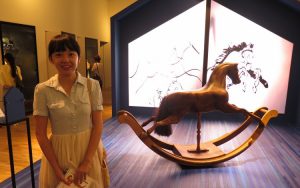My name is Yanfei Wu.
Yanfei is my first name. I do not have a middle name. Chinese characters are totally different from English, not alphabets. “Yan” is a multi-stroked pictographic character that is easily recognized. The widely known meaning is the bird– swallow. This Chinese character gives us a vivid picture of a swallow spreading its wings and extending its feathers. Swallows return to Northern China every spring, as a result, the bird becomes a symbol of spring that represents hope and the future. The swallow is extolled as an ambassador of spring in paintings, songs and poems throughout all ages in China. In ancient China, folks took delight in accommodating swallows nesting and bearing offspring in their houses and regarded it as good fortune and a blessing. Actually, it is the surficial meaning of “Yan” in my name. Not only does it signify a very firm conviction and passes a good wish, my grandfather gave the name to me, but expresses strong feelings of homesickness. When the pronunciation changes from first tone to fourth tone, it sounds more similar to the Anglicized pronunciation of my name. My name is a deeply significant. My grandfather hoped I would remember my whole family emigrated from Jiangsu Province. It used to be a fiefdom of a prince. His title was “Prince Yan” and he became the Yong Le Emperor, one of the most distinguished dominators in history in China. He moved the capital of China to Beijing, which is known as “Yanjing.” In addition, my grandfather hoped I would be a person with great ambition, even I am a female.
There are several characters that have the same pronunciations as “Fei”, with different forms and different meanings. The character, in my name is an adjective, describing a scene of a rain shower mixed with snow. It comes from famous sentences in the only realistic poem in the Book of Songs, which is the earliest existing collection of Chinese poems and songs (the 10th to the 7th centuries BC). “At first, when we set out, The willows were fresh and green; Now, when we shall be returning, the snow will be falling clouds.”(Tr. by James Legge) The first part of the sentence is the view of spring; the last part is describes the scene of winter. The background of the poem is soldiers coming home after year-long expeditions. They experienced the dangers of war, the pains of torture, and the pangs of starvation. Also, we can feel the sad and tired feeling between the lines not only because a whole year fighting, but the feeling of missing their families. Furthermore, it express a vital idea — family play a significant role in the lives of Chinese people. They go home, no matter what kind of troubles are in front of them.
People often incorrectly write my name in two common ways. The main reason is that they interpret two different images. First is, “the swallow flies”; the other is Spring is a vibrant season of blooming flowers and grass turning green, and the swallow is coming.” Because there are two “Fei” characters that express “flying ” and “blooming season”, they are more commonly preceded by “Yan”.
This is my name, which is meaningful and influential on my mind and behavior. Sometimes when I am confronted with difficulties, I should, like a soldier, be strong and confident and I can conquer them. Besides, I always know that my family will be there for me. I love them. Although my grandfather passed away two decades ago, I can still feel him somewhere: his beliefs and expectations accompany with me forever.



